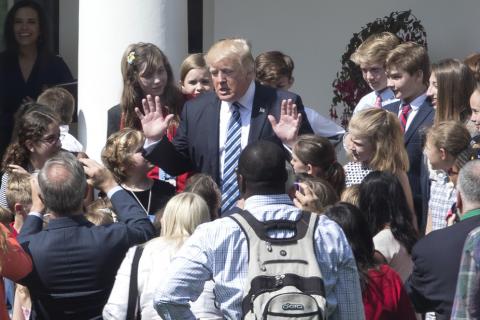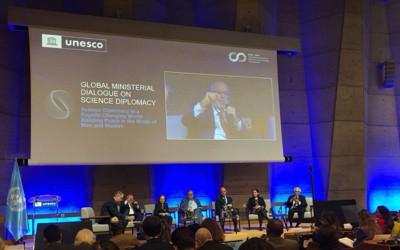Does poor spelling really mean Donald Trump isn’t fit to be president?

In the aftermath of a controversial clash of protests in Boston, Donald Trump sent out a tweet about the need to heal the nation – managing in the process to misspell the word “heal”. He then quickly deleted the tweet, resent it with the same mistake, deleted the second attempt, until finally getting it right the third time around.
The response across social media was predictably caustic. As one tweeter put it: “If you don’t know the difference between #heel and heal, you shouldn’t have the nuclear codes and you sure as heck shouldn’t be POTUS.” Similar mockery has greeted his previous linguistic fumbles, not least the notorious “unpresidented”, which was picked by some as 2016’s word of the year.
It’s easy to mock this sort of thing, especially in such dark times. But is Trump’s poor spelling really another sign that he’s unfit to be president, or just an indication that language and communication practices are continually changing? And what does debate around this tell us about the importance that’s accorded to spelling in society in general?
Since the standardisation of the English language in the 18th century, and particularly since Samuel Johnson’s dictionary was published in 1755, incorrect spelling has carried a particular social stigma. Being able to spell is often seen as an emblem of a good education and solid moral character, and in the case of political leaders, an indication of due attention to detail and decorum.
This norm is so embedded that over the years, rogue spelling errors have inflicted serious damage on a number of political careers. The most well-known of these is probably George HW Bush’s famously inept vice-president, Dan Quayle: visiting a school in 1992, he “corrected” a student’s spelling of the word “potato” to “potatoe”. This simple error became one of the lasting images of his career, and was interpreted not simply as a sign that he couldn’t spell one of the more common root vegetables, but that he was of impoverished intelligence generally.
Then there was the furore over a mistake Gordon Brown made towards the end of his tenure as prime minister of the UK, when he was accused by the mother of a soldier killed in Afghanistan of disrespecting her son’s memory by incorrectly spelling his name. But Brown’s handwriting is famously bad due an to eye injury sustained in his youth, and for many commentators, the way this incident was promoted by The Sun newspaper was a personal attack, manipulating the sentiments around the tragic death of a member of the armed forces for political ends.
Far from unpresidented [sic]
One reason these issues provoke such controversy, and why spelling is so venerated in society generally, is because of the relationship it has with literacy, which is such a cornerstone of modern civilisation. Yet English spelling is, to say the least, notoriously idiosyncratic. As Rousseau wrote: “To know English one must learn it twice: first, to read it, and second to speak it.” And many eminent writers over the years, from Mark Twain to H.G Wells and C.S Lewis, have promoted wholesale reformation (and simplification) of our spelling system.
Poor spelling isn’t even, to paraphrase, unpresidented. In fact, Trump shares the trait with his political hero, Andrew Jackson. In 1833, Harvard University decided to give Jackson an honorary doctorate; one of their alumni, John Quincy Adams (who happened to have lost the presidency to Jackson five years earlier) boycotted the ceremony, saying that it was a disgrace to give such an honour to “a barbarian who could not write a sentence of grammar and hardly could spell his own name”. To which Jackson pithily remarked that “it is a damn poor mind indeed which can’t think of at least two ways to spell any word”.
Trump has, of course, received a barrage of derision for his assorted mistakes – as another tweeter remarked, “how does a man who wants to limit immigration to only English-speakers [as announced in the RAISE Act] manage to misspell ‘heal’ twice in one tweet?” – but the incidents have done little to change anyone’s opinion of him one way or the other. And that says a lot about what the rules of language are really for.
As Claire Fallon wrote in the Huffington Post, the fact that Trump can ride out something like this is nevertheless a sign of the privilege he enjoys as a wealthy white man. Conservative commentators would surely have pounced on Barack Obama for any similarly slapdash use of language, given how regularly they called his qualifications into question.
 This is the problem with spelling hawkery: it often has little to do with clarity of communication, and everything to do with class and social positioning. Everyone makes mistakes, after all; and so Trump’s dismissive attitude to linguistic proprieties and pedantry may in fact bolster his powerful anti-elitist brand.
This is the problem with spelling hawkery: it often has little to do with clarity of communication, and everything to do with class and social positioning. Everyone makes mistakes, after all; and so Trump’s dismissive attitude to linguistic proprieties and pedantry may in fact bolster his powerful anti-elitist brand.
Philip Seargeant, Senior Lecturer in Applied Linguistics, The Open University.
This article was originally published on The Conversation. Read the original article.
Quarterly Review of Research
Read our Quarterly Review of Research to learn about our latest quality academic output.

Contact our news team
For all out of hours enquiries, please telephone +44 (0)7901 515891
Contact detailsNews & articles

How can science and technology build a fairer, more sustainable world?
This question was at the heart of the Global Ministerial Dialogue on Science Diplomacy, held on 13 March 2025 at UNESCO Headquarters in Paris.